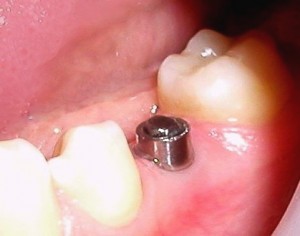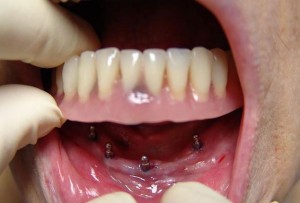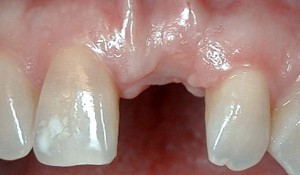Dental implant alternative

In case of loss of teeth, their obligatory restoration is necessary.
In this case, the question arises which prosthetics method to prefer.
The dentist will help to answer this question and make the right choice.
And do not postpone a visit to the doctor, because tooth problems not only develop rapidly, but also exacerbate the situation.
Many patients, because of the popularity of implantation, have a strong belief that dental implants are better than their own teeth.
It would seem that having implants, the patient can no longer visit the dentist, forget about pulpitis and caries and have a beautiful smile.
However, no implant can replace natural teeth. Can implantation be avoided?
If, however, the installation of dental implants is impossible for any reason, then the alternative to dental implants is the traditional methods of prosthetics.
Today, prosthetics are possible without resorting to implantation in the following ways:
- By removable dental prosthetics.
- Permanent dental prosthetics.
Removable prosthetics
The simplest and least aggressive method of tooth restoration is removable prosthetics.
Perhaps with the help of special removable structures:

- Nylon dentures allow restoration of some teeth and a complete dentition. They are fixed in the oral cavity using special hooks made of the same material as the whole structure. Nylon prostheses are soft, comfortable designs that provide a comfortable condition for its owner.
- Lamellar dental constructions are used in case of partial or complete absence of teeth. Such designs have many disadvantages and are very inconvenient to use. They are poorly fixed and cause discomfort, both when worn, and when eating and talking.
- Clasp dentures are characterized by very good fixation and even distribution of chewing load. The design is based on the presence of a metal arc. Fixing elements - metal hooks cause physical discomfort (rubbing the gums) and aesthetic unattractiveness.
Fixed (permanent) prosthetics
Fixed prostheses, unlike removable ones, restore chewing function better.
They are made of plastic, metal, ceramics, cermets, zirconia.
Permanent dentures include:
- Dental crown. It serves to restore the tooth, in which the preservation of the root is a prerequisite.
- Bridge prosthesis. A design that is a series of artificial teeth. The prosthesis is fixed on adjacent living teeth, which are pre-machined.
If the patient has partially preserved his own teeth, then a combination of removable and fixed prostheses can become an alternative to implantation.
There is an option between full implantation and removable dentures.
This is the installation of mini - implants and the attachment of a removable denture to them.
Using mini - implants, the attachment of a removable prosthesis is more reliable than that of a suction cup.
Video: “What are the types of prosthetics”
When implantation is required
From the point of view of aesthetics and normal load on the jaw, prosthetics on implants will be ideal.
However, this method of prosthetics is resorted to only at the request of the patient in the event that there are indications and there are no contraindications.
- With complete loss of teeth, traditional prosthetics can no longer do, and implantation is the only way to restore the dentition. If the root remains in the gum, then there is the possibility, in addition to implantation, to establish a dental crown.
- If several teeth are missing, then the implantation technology allows you to install several rods at the same time, allowing you to restore lost teeth.
- If you need to solve the problem of missing teeth for a long time, then dental implants will be the solution to the problem. The service life of implants is not limited if they are correctly installed and with proper care.
- If it is necessary to restore the dentition so that artificial teeth are not visible to others, then implants will be the best choice. Traditional prostheses, unlike teeth on implants, over time become clearly visible to others due to the gradual atrophy of the gum tissue.
- If you refuse to turn the abutment teeth, it is better to choose the installation of implants. In the process of implantation, adjacent teeth are not affected and their damage is minimized.
Indications for implantation:

- Lack of one or more teeth.
- Loss of more than one tooth in a row.
- Lack of extreme teeth in a row.
- Large gaps between the teeth.
In addition to a long list of contraindications, dental implantation has a high cost.
A more acceptable cost solution may be mini implantation.
Dental implantation is practical, natural, beautiful, but not always advisable.
Therefore, before deciding to implant implants, it is worth listening to the opinion of the dentist.
Dental reimplantation
This technology allows not only to give new life to teeth in need of removal, but also takes dental prosthetics to a new level.
The reimplantation operation turned out to be quite a progressive and less expensive method compared to traditional implantation.
The technology of prosthetics is to return the tooth to be removed as a natural implant.
To carry out such an operation requires a number of conditions:
- The presence of teeth on both sides of the removed.
- High skill of the surgeon: tooth extraction must be carried out so that the bone bed, where the root was fixed and the extracted tooth remained intact.
After tooth extraction, the surgeon cleans the hole and conducts anti-inflammatory treatment.
- Dentist - therapist, heals a tooth: seals holes, channels, polishes.
- After everything is done, the tooth is returned to its place.
- Fasten by soldering to neighboring teeth on the back with a photopolymer thread.
Over time, the drug embedded in the hole resolves, helping to fix the reimplant in the bone tissue.
According to the dentists: the native tooth takes root within three months.
Benefits of Reimplantation
- Fast osseointegration.
- The probability of tooth rejection is minimal.
- The patient receives the finished tooth immediately.
- This technique is much cheaper, because There is no need to buy expensive implants.
- Contraindications are minimized.